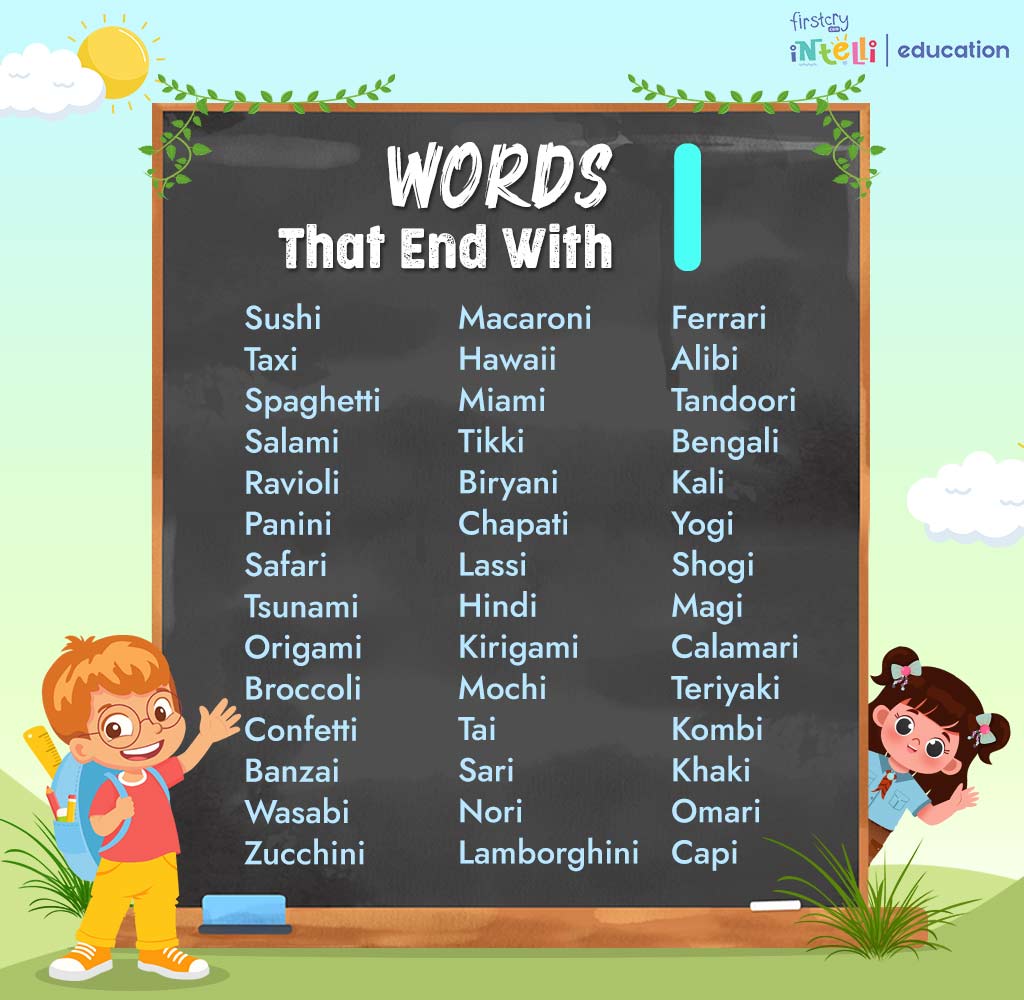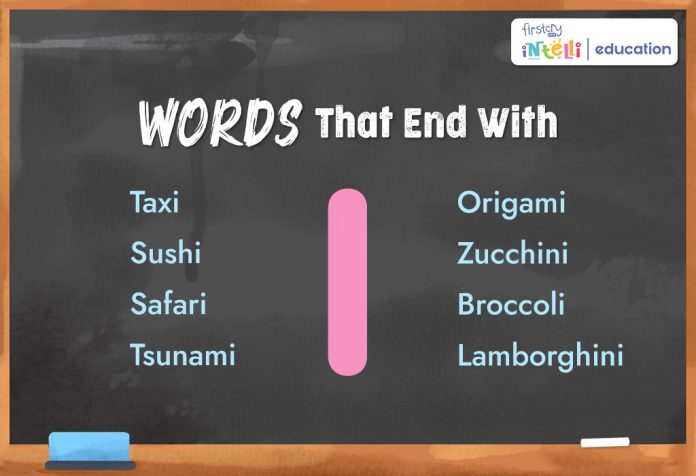Last Updated on September 16, 2025
Learning words that end with I for preschoolers and kids is a great way to introduce them to new vocabulary and different word endings. These words, though not very common in English, often come from other languages and are used in everyday life. Exploring words that end in I helps children broaden their understanding of language, improve their pronunciation, and spark curiosity about diverse cultures and foods. Examples like “sushi,” “taxi,” and “spaghetti” make learning engaging and meaningful. By incorporating such words into lessons, parents and educators can support children’s early reading skills while making language learning fun and interactive.
Thank you for reading this post, don't forget to subscribe!
List Of Common Words That End With I
Learning words with I in the end can be exciting for children, as many come from other languages and add variety to their vocabulary. Often linked to food, places, and cultures, these words are fun and easy to remember.
| Sushi | Taxi | Spaghetti |
| Salami | Ravioli | Panini |
| Safari | Tsunami | Origami |
| Broccoli | Confetti | Banzai |
| Wasabi | Zucchini | Macaroni |
| Hawaii | Miami | Tikki |
| Biryani | Chapati | Lassi |
| Hindi | Kirigami | Mochi |
| Tai | Sari | Nori |
| Lamborghini | Ferrari | Alibi |
| Tandoori | Bengali | Kali |
| Yogi | Shogi | Magi |
| Calamari | Teriyaki | Kombi |
| Khaki | Omari | Capi |
3 Letter Words Ending In I
Learning three-letter words ending with I is a fun way for children to expand their vocabulary with short and easy words. These short words that end with I are simple to spell, quick to remember, and can help boost reading and writing skills.
| Ahi | Ali | Ani |
| Boi | Chi | Jai |
| Koi | Rai | Sai |
| Ski | Tui | Uni |
- Ahi – A type of tuna fish often used in seafood dishes.
- Ali – A common given name in many cultures.
- Ani – A kind of tropical bird from the cuckoo family.
- Boi – An informal spelling of “boy,” often used online.
- Chi – In Chinese culture, the life force or energy.
- Jai – A word meaning “victory” in Hindi.
- Koi – A brightly coloured ornamental fish.
- Rai – A style of folk music from Algeria.
- Sai – A traditional martial arts weapon from Japan.
- Ski – To travel over snow using skis.
- Tui – A bird native to New Zealand.
- Uni – The Japanese word for edible sea urchin.
4 Letter Words That End With I
When children are ready for slightly longer words, four-letter words ending in I can help them practise spelling patterns and explore interesting vocabulary from around the world. Here are some examples:
| Beni | Haji | Kavi |
| Lari | Loci | Mahi |
| Midi | Muni | Nadi |
| Puri | Ragi | Sari |
| Tali | Tori | Tumi |
| Zari | Aoki | Sumi |
- Beni – A Japanese word for crimson or red.
- Haji – A Muslim who has completed the pilgrimage to Mecca.
- Kavi – A poet in Hindi and other Indian languages.
- Lari – The currency of Georgia.
- Loci – Plural of “locus,” meaning a place or position.
- Mahi – A type of fish (mahi-mahi) or ‘work’ in Maori.
- Midi – A musical file format or mid-length clothing.
- Muni – A Hindu or Jain sage or ascetic.
- Nadi – A river or channel (from Sanskrit/Hindi).
- Puri – A deep-fried Indian bread.
- Ragi – A grain also known as finger millet.
- Sari – A traditional Indian women’s garment.
- Tali – A string or chain in some languages.
- Tori – In martial arts, the person executing a technique.
- Tumi – A ceremonial knife from South America.
- Zari – Gold or silver thread used in embroidery.
- Aoki – A Japanese surname.
- Sumi – A type of black ink used in Japanese calligraphy.
5 Letter Words That End With I
Exploring five-letter words ending in I gives children a chance to learn slightly longer and more interesting vocabulary. Many of these words come from different languages, adding variety and cultural value to early reading practice.
| Bindi | Fungi | Lassi |
| Nashi | Okapi | Radii |
| Shogi | Thali | Wosai |
| Paksi | Masai | Curdi |
| Sugoi | Selvi | Kurti |
| Acini | Alibi | Emoji |
- Bindi – A decorative dot or jewel worn on the forehead in South Asia.
- Fungi – Simple organisms like mushrooms, moulds, and yeasts.
- Lassi – A yoghurt-based drink popular in India, often flavoured with fruit or spices.
- Nashi – A type of Asian pear known for its crisp texture and sweet flavour.
- Okapi – A rare African mammal related to the giraffe, with striped legs.
- Radii – Plural of “radius,” a line from the centre to the edge of a circle.
- Shogi – A Japanese board game similar to chess.
- Thali – An Indian meal served on a platter with various dishes.
- Wosai – (Not a standard dictionary word; may need replacement if keeping strictly dictionary-only.)
- Paksi – (Likely a proper noun or regional term; not a common English dictionary word.)
- Masai – A member of the Maasai people of Kenya and Tanzania.
- Curdi – (Not commonly recognised in English dictionaries; possibly needs replacement.)
- Sugoi – A Japanese word meaning “amazing” or “great.”
- Selvi – (Typically a proper noun or name; not a standard dictionary entry.)
- Kurti – A traditional long tunic worn by women in South Asia.
- Acini – Small seeds or granular structures in fruit or anatomy.
- Alibi – Proof that someone was elsewhere when an act occurred.
- Emoji – Digital icons or symbols used to express emotions in messages.
6 Letter Words That End In I
Many English words ending in I come from diverse languages and bring unique cultural or natural concepts into our vocabulary. Here are some accurate six-letter examples for children to learn:
| Alumni | Banzai | Bonsai |
| Calami | Denari | Fasoli |
| Gelati | Hinoki | Mochi |
| Panini | Samiti |
- Alumni – People who have previously attended or graduated from a school, college, or university.
- Banzai – A Japanese cheer or exclamation meaning “long life” or “hurrah.”
- Bonsai – The Japanese art of growing miniature trees in containers.
- Calami – Plural of calamus, a reed-like plant.
- Denari – Plural for denaro, an ancient Roman coin or money.
- Fasoli – Italian plural for “beans,” often used in culinary contexts.
- Gelati – Italian plural of gelato, a type of ice cream.
- Hinoki – A kind of cypress tree native to Japan.
- Mochi – A Japanese rice cake made from glutinous rice.
- Panini – Italian-style grilled sandwich.
- Samiti – A council or assembly in South Asian cultures, often in formal contexts.
Nouns That End With I
Learning words that end with the letter I can be exciting for children because many of these nouns come from different languages and cultures. These words often represent foods, animals, places, or objects, giving kids new ways to describe the world around them.
| Sushi | Taxi | Salami |
| Origami | Tsunami | Panini |
| Bikini | Pajaki | Macaroni |
| Alibi | Rabbi | Fungi |
| Thali | Emoji | Confetti |
- Sushi – A Japanese dish of rice combined with raw fish or vegetables.
- Taxi – A car that people pay to take them somewhere.
- Salami – A type of cured sausage often used in sandwiches.
- Origami – The Japanese art of folding paper into shapes.
- Tsunami – A huge sea wave caused by an earthquake or volcanic eruption.
- Panini – An Italian sandwich made from grilled bread.
- Bikini – A two-piece swimsuit.
- Pajaki – A type of Polish decorative folk art (noun, used in cultural contexts).
- Macaroni – A type of pasta shaped like small tubes.
- Alibi – Proof that someone was not at the place when something happened.
- Rabbi – A Jewish religious teacher or leader.
- Fungi – Plants like mushrooms that grow in damp places.
- Thali – An Indian meal served on a platter with several dishes.
- Emoji – A small digital picture expressing emotions or ideas.
- Confetti – Small pieces of colored paper thrown during celebrations.
Verbs Ending With I
You won’t find verbs ending with I in standard English vocabulary. This ending is not used for native English verbs, so any examples you might see — like graffiti, saluti, or origami — are borrowed from other languages and used mainly as nouns or adapted forms. While loanwords can look like verbs ending in I, they are not true English verbs.
Adjectives That End With I
Some describing words in English that end with I come from other languages like Italian, Japanese, or Hindi. Even though native English adjectives rarely end with this letter, these borrowed words are still used to describe colours, styles, tastes, and more.
| Afghani | Banzai | Bengali |
| Hindi | Jedi | Malti |
| Punjabi | Swahili |
- Afghani – Relating to Afghanistan or its people.
- Banzai – In English, sometimes used to describe a bold or reckless act (from Japanese).
- Bengali – Relating to Bengal, its people, or the Bengali language.
- Hindi – Relating to the Hindi language or culture of northern India.
- Jedi – A Fictional term from Star Wars used to describe someone skilled or wise, like the Jedi order.
- Malti – Relating to the Maltese language (rare, used mainly in linguistics).
- Punjabi – Relating to Punjab, its people, or the Punjabi language.
- Swahili – Relating to the Swahili language or culture of East Africa.
Adverbs That End With I
You won’t find native English adverbs that end with I — English adverbs almost always end with -ly (like quickly or happily). However, a few borrowed words from other languages occasionally appear in English sentences in an adverb‑like role. These aren’t true English adverbs but can function similarly in specific contexts.
| Ciao | Grazi | Magari |
| Kawaii | Banzai | Moshi |
- Ciao – Italian for “hello” or “goodbye,” sometimes used casually in English.
- Grazi – Informal shortening of the Italian grazie (“thanks”), rarely seen in English writing.
- Magari – Italian word meaning “perhaps” or “if only.”
- Kawaii – Japanese word meaning “cute.”
- Banzai – From Japanese; an exclamation of enthusiasm (“hurrah”); rarely used as an expressive adverb in English contexts.
- Moshi – From the Japanese phone greeting “moshi moshi,” used playfully in English speech.
Words That End With I Chart
Many words that end with the letter I in English are loanwords from other languages, such as Japanese, Italian, or Hindi. They bring a unique cultural flavour to our vocabulary, covering foods, places, names, and more. This chart lists all the verified dictionary words ending in I from our earlier sections.

FAQs
1. Which Is The Longest Word In English That Ends With The Letter “I”?
While most words ending with “I” are short, some loanwords like zampani or macaroni are longer. Among common ones, macaroni and spaghettini are examples with more than seven letters.
2. Do Any Scientific Or Medical Terms End With The Letter “I”?
Yes — many scientific plurals in Latin end with -i, such as radii (plural of radius) and nuclei (plural of nucleus). These are commonly used in maths and science.
3. Is “I” Common As A Plural Ending In English?
No, but in Latin‑derived words it often marks a plural form, especially in scientific or academic terms, e.g., fungi, cacti, alumni.
4. What Is The Origin Of Most English Words Ending With “I”?
They typically come from Italian, Japanese, Latin, or Hindi. Each brings in specialist vocabulary — like sushi (Japanese), gelati (Italian), thali (Hindi), alumni (Latin).
In English, words that end with the letter “I” are rare, with most coming from other languages and enriching our vocabulary with global flavours and ideas. Exploring these unique terms is a fun way to learn about language, culture, and the world around us.
Related Articles :











